C. Litka's Blog, page 63
August 29, 2017
Some Day Days Version 3
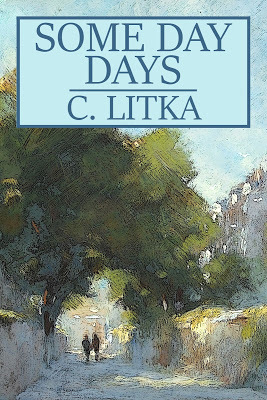
I have finished rereading and slightly revising Act One of the Hugh Gallagher memoir/romance/saga, Some Day Days. The revised version, number 3, is now available wherever fine ebooks are sold.
It seems that I've been writing stories off and on almost all my life. Recently, going through some old boxes in the attic, I was surprised to discover a whole stash of handwritten stories I'd written during my 6ththru 8th grade years. I'd forgotten all about them – I have a very poor memory of my life. I also have several typewritten manuscripts on a shelf from my 20's – a fantasy novel, a science fiction novella, and at least one short story – and their rejections slips. From my 30's I also discovered extensive notes from a planned novel about a weapon that could destroy IBMs in space – a cold war s-f novel. From my 40's I have the manuscript of a young adult adventure story set in Scotland. I had written it on a X88 computer – a little laptop device from England – and printed it out on a dot matrix printer, a step up from a typewriter. In my mid-50's I took up writing again as a challenge. This time a full fledged computer made things a lot easier, and I wrote the long short story, Kiss of the White Witch. This turned out to be piece one of the continuing Gallagher stories that evolved into Some Day Days (A Romance in an Undetermined Number of Pieces). I ended up writing 12 pieces, a mere a quarter of the pieces I'd imagined while daydreaming up the complete story of Gallagher's wooing of Selina Beri in my head.
The pieces of Some Day Days were the first efforts of my late life writing, and it probably shows. Still, I took an idea, made it into a story, and then put it into words, the hard part. Irregardless of the quality, this is an accomplishment not to be sniffed at. And it opened the door to writing more stories, allowing me to fulfill a long held ambition to be a science fiction writer. And as such, it plays an important part in my development as a writer. I'd like to think I gotten better at writing as I've gone along, but even so, I feel that Some Day Days while, far from perfect, is good enough to see the light of publication. And while it is the least downloaded and likely least liked of my books, and probably not unfairly, I am, nevertheless, quite fond of it.
Once again, I made only minor changes to make it read a little more smoothly, and fixed some misspellings. One thing I couldn't find a way to fix was the curious case of two different types of apostrophes, a curly one, and a straight one. I don't know where the curly ones came from, but even switching fonts back and forth failed to eliminate them. No doubt an artifact of a long obsolete version of OpenOffice on a Mac. I also updated its blub, which was long overdue. It seems that I'd not touched it since I first put it up in 2015, since it was still advertising the fall 2015 release of Planets of Call, my original title for The Bright Black Sea.
Other than rereading my old stories, I'm still struggling to find a story to write for 2018. I've ideas, but no stories that I can get enthusiastic about. And without a publishing contract to flog me to work, I need to be enthusiastic about a story to sit down and get to work on it.
Published on August 29, 2017 13:42
August 24, 2017
The Bright Black Sea Revised Version 5
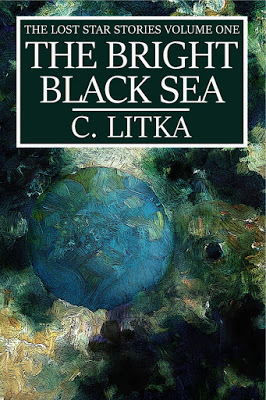
I've reread, revised, and released version 5 of The Bright Black Sea. I make no claims to being a proofreader, especially of my own work. I tend to read what I expect to read, and when it comes to my own work, I pretty much know what I'll find, (whether it's there or not) so I don't look all that closely. That said, I did add a lot of Oxford commas, broke up some run-on sentences, added a few words here and there to make it read smoother. I also eliminated a few words and some lines that even I couldn't make head or tails out of. Along the way I corrected a the few misspellings (i.e. Strata is the plural of stratum, not “stratums” – go figure) and generally conformed to what my spell checker wanted. (For example, it doesn't like “onboard,” which is a perfectly good word. I changed it to “on board” just to make it happy.)
In addition to his housekeeping, I did some minor revisions. I made the opening a little sharper. I always felt that it was rather awkwardly written. I rewrote the scene where I introduced Botts. I had written it before I had any idea what I was going to do with Botts, so with the advantage of 20/20 hindsight, I wrote what I think is a much smoother scene. I papered over several minor plot holes – not because they were all that important, but because I hate plot holes, especially my own. And I added a little bit of explanations here and there. Again, nothing to write home about. I hate reading blurbs that give half the story away, so I avoid outlining my plots in the blurbs, and since I don't know if you've read the story or not, I'm going into the details of the plot holes or revisions. If you're curious, drop me a line.
All in all, I was happy with what I found when I read through the story again. I believe it has been a year since I last read it – but this time was a bit different – I've written a lot more words since then, and I've gotten Litang's story to its ending, so I was able to look on it as the final product. Of course, it is what it is, and nothing I did changed that. But when you go back and read something that you started writing four or five years ago, it can be rather iffy. You could well discover something that you'd not want to be found dead in a ditch with.The Bright Black Sea has its flaws, but I think it is a story I can be proud of. So, if you haven't gotten around to reading the story yet, or if you ever want to reread it again, make sure you have version 5. It's free, as always.
Published on August 24, 2017 18:58
August 14, 2017
A Hole in the Day
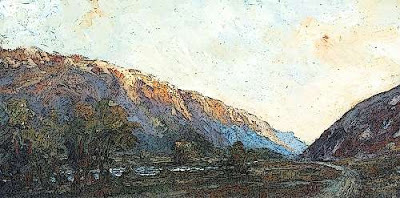
For the better part of the last four or more years, I've spent some two hours a day writing, revising, or working on covers, blurbs, etc. Some days I reached a good breaking point 1 ½ hour in. On others, when things are going well, I might work 2 ½ hours. I do most of my writing the first thing in the morning, getting my work done by 10 o'clock for a cup of tea and some sweets. Some days, when in the heat of creation, I'd put an hour or two work in the evening as well. It is amazing how fast time flies by when you're writing. Now, this is not a whole lot of time in a day, but I find that with no story in hand to work on, there is a noticeable hollow in my day that I need to fill. Since I can't conjure up a story with a snap of my fingers – I've had to find other projects to work on to fill that hollow.
The first project has been rereading, and slightly revising A Summer in Amber. Mostly it involved filing off a few rough edges, and touching up a few clunky lines – adding or subtracting a few words, adding commas, breaking up long, rambling sentences, and correcting a few mistakes that I found. I did however, rewrite one scene, the scene on the hill after the Gate opens. I was never happy with it, but in the end, I rather gave up on it. I've now taken the opportunity to streamlined it, making it read clearer and more logically. I also slightly touched up the opening and ending.
Version 5 (12 August 2017) is now the newest, best, and, hopefully, the last version. It is now available from all the usual suspects. If you have downloaded earlier versions are are now just thinking of reading it, I would urge you to download this version. The changes are relatively minor, but it is a better, and likely the definitive version of the story.
With A Summer in Amber done, I've now started rereading The Bright Black Sea. Again, my object is to make it read just a little better. Besides more commas, and shorter, clearer sentences, I find that I'm adding words here and there – I guess I was writing rather telegraphically back then. In any event, the changes will be minor. My attitude is that it is what it is and my goal is to make it read a little smoother. Sometimes you wonder just what you wrote, and rather fear finding out. The Bright Black Sea goes back far enough that I wasn't so sure what I'd find. In rereading it, I find that it isn't all that bad. I know it begins slow, and has a fair amount of not strictly necessary details, but I'm comfortable with that. Still, having spent so much time going over and over it when I wrote it, it is hard to tell how it reads to someone for the first time. But when all is said and done, it is what it is, and I can't change it beyond soothing it out a bit. Look for this slightly improved Version 5 of The Bright Black Sea in the coming weeks.
No doubt Some Day Days will get its read through as well. Hopefully after that, I'll have a story (or two) in mind to fill my days.
Published on August 14, 2017 19:45
August 7, 2017
A Summer in Amber Version 5
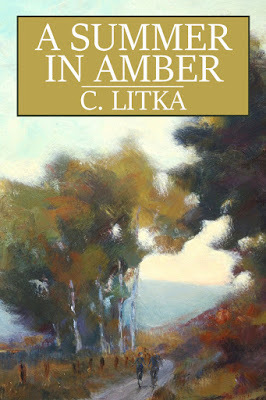
I have released a slightly revised version (#5) of A Summer in Amber -- some corrections made, thanks to notes from Carlos, a slightly revised opening paragraph, along with a slightly revised cover. My current windows computer does not have the same LibreOffice fonts my old mac mini had, so that my recent titles used a different title font. I decided to make all the books uniform, so I reworked the covers, and while I was at it, I took the opportunity to add Nesta and Sandy on their bikes to the A Summer in Amber cover as well.
While I was making the corrections to A Summer in Amber, I was sort of dismayed by some of the passages I read. I think I could now do better. I'm tempted to read through the story again and smooth out some of the most awkward passages. The only problem is that I don't trust myself not to add about a 100 typos to the book in the process, no matter how careful I am. I seem to be blind to typos. We'll see how bold and ambitious I am in the coming months.
Which brings us to the next book. So far I've not stumbled on any new story to tell, so it's hanging fire. I've had several ideas for characters, locale and such, but no story to tell. I'd like to do something different if only to see if I can attract a different set of readers. A fantasy is possible, but I'm not really fond of fantasies -- at least those with magic and some vast, frightening evil that must be defeated, sometime within the first dozen or so books -- which is to say, most fantasies. I'm thinking of something set in a bit more modern world, likely without magic, which may not make it a fantasy at all. We'll see.
Published on August 07, 2017 18:32
A Summer in Amber Version 4

I have released a slightly revised version (#4) of A Summer in Amber -- some corrections made, thanks to notes from Carlos, a slightly revised opening paragraph, along with a slightly revised cover. My current windows computer does not have the same LibreOffice fonts my old mac mini had, so that my recent titles used a different title font. I decided to make all the books uniform, so I reworked the covers, and while I was at it, I took the opportunity to add Nesta and Sandy on their bikes to the A Summer in Amber cover as well.
While I was making the corrections to A Summer in Amber, I was sort of dismayed by some of the passages I read. I think I could now do better. I'm tempted to read through the story again and smooth out some of the most awkward passages. The only problem is that I don't trust myself not to add about a 100 typos to the book in the process, no matter how careful I am. I seem to be blind to typos. We'll see how bold and ambitious I am in the coming months.
Which brings us to the next book. So far I've not stumbled on any new story to tell, so it's hanging fire. I've had several ideas for characters, locale and such, but no story to tell. I'd like to do something different if only to see if I can attract a different set of readers. A fantasy is possible, but I'm not really fond of fantasies -- at least those with magic and some vast, frightening evil that must be defeated, sometime within the first dozen or so books -- which is to say, most fantasies. I'm thinking of something set in a bit more modern world, likely without magic, which may not make it a fantasy at all. We'll see.
Published on August 07, 2017 18:32
July 18, 2017
Lost Star's Sea Update
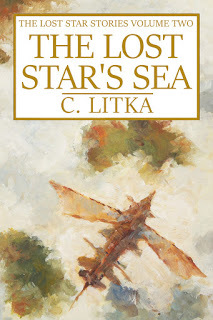
The Lost Star's Sea is now available on iBooks, Kobo, Barnes & Noble, Smashbooks and Amazon (US) for my preferred price of FREE. It may the equivalent of $.99 in non-US Amazon stores, since Amazon only occasionally price matches free in their non-US stores.
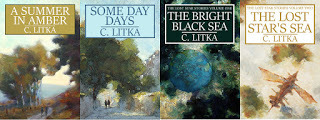
All four of my novels are now available for Free in the US, and world-wide on Smashwords, and on iBooks, Barnes & Noble, Kobo, Indigo, and other outlets for free as well.
Next novel due in the summer of 2018 -- if I can think of a story to write.
Published on July 18, 2017 13:18
July 14, 2017
The Lost Star's Sea is now published
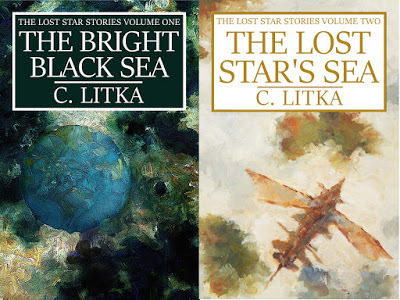
Both the revised edition of The Bright Black Sea and its complete sequel, The Lost Star's Sea are now available for free on Smashwords and for $.99 on Amazon. Once The Lost Star's Sea makes it to iBooks, Kobo and Barnes & Noble, for free, I'll see if Amazon will match that price.
However much the river winds, it finds the sea at last
It has been a five year journey down that winding river for me in the dreaming and writing of Wil Litang's story. It began with the realization that most of the stories I enjoyed in my youth didn't quite cut it for me any more -- they seemed thinly plotted and populated with cardboard characters. I wanted more from a story. And that if I wanted an old fashioned story with something more, I'd have to write it myself. I gave myself a challenge -- if I was going to write an old fashioned science fiction adventure story, I'd go full retro -- no faster than light drive, no "artificial gravity." No, I'd go full retro, full Tom Corbett, Space Cadet, with rocket ships and magnetic space-boots. But since there are no longer jungles on Venus, nor ancient ruins in the sands of Mars, I'd have to set my stories in another solar system. I created the Nine Star Nebula to give myself plenty of worlds of wonder to imagine. 675,000 words later, the story of Captain Wil Litang has run its course. I may return again to the Nine Star Nebula, there are still hundreds of worlds to visit and perhaps stories to tell. We'll see.
Published on July 14, 2017 07:17
July 12, 2017
Pela Chart
In order to help readers envision Wil Litang's travels throughout this little section of the Archipelago, I worked up this sketch map of the story's Pela. It is not drawn to scale; it merely shows the relative positions of the major islands Wil discovers in this travels.

I don't think it is necessary to include a list of characters. While there are many named, the major ones play a prominent part in each section and are easy to keep track of.

I don't think it is necessary to include a list of characters. While there are many named, the major ones play a prominent part in each section and are easy to keep track of.
Published on July 12, 2017 17:59
Lost Star's Sea Background
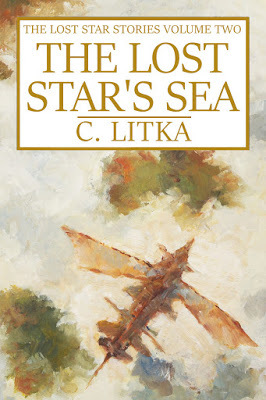
I set out to do three things with The Lost Star's Sea – the first was to write a fitting companion volume with The Black Bright Sea. The Black Bright Sea runs some 320,000 words in length and I wanted to have a matching companion volume. As it turned out, I rather overshot the mark and ended up with 350,000 word story, though it does include the 2016 release, The Castaways of the Lost Star. The remaining 80% of the book, however, is all new material.
There are some in publishing these days think who readers have less time to read and want shorter works – novellas rather than novels to fit into their busy lives. Obviously I disagree, however, even if this is the case, because this novel is written as a series of linked but self-contained episodes, each with beginnings, middles and endings, The Lost Star's Sea can be read, episode by episode, at whatever pace you desire.
My second challenge was to write a planetary romance type of story, like those made famous by Edgar Rice Burroughs, Jack Vance, and others. And to treat it as I had the classic space opera; by updating the social norms of a hundred years ago, and taking the often cardboard characters of those pulp works and fleshing them out into well-rounded, engaging characters. I also try to ground my story and characters in a realistic world, by paying some attention to the everyday details of life and keeping the dangers and the character's responses to them realistically human.
And finally, in a field were grim, often apocalyptic stories, and unpleasant characters seem common, I wanted to write a lighthearted adventure with humor and characters with whom the readers would like to travel with.
And I should note that as much as I love reading series books – this volume brings Wil Litang's adventures to a close. At 675,000 words – six good sized novels' worth – I think ol'Wil Litang has earned his cha garden.
I don't like reading blurbs that outline the story to be told, so I'll not share the plots of the book. I'll just say that the story owes a lot to Edgar Rice Burroughs – filtered through my personal tastes, and updated to reflect the changes in society over the last century. I like understated things, small, clever, quiet things, everyday life. Big, grand things don't appeal to me, and dangers need not be more pressing than personal extinction All of which is to say that Wil Litang effortless avoids becoming the Warlord of the Pela. He's often lucky to survive. I have retained the romance element of ERB's stories, but Wil's love interest is no princess – and she certainly doesn't need saving, though he gallantly tries. Part of the fun of writing the story was turning ERB's scenes on their heads. Wil may burst into a room to save his love, only to find her having tea and quiet conversation with her captor. In addition, I've tried to create strong female characters who are as competent as any male counterparts, and tried to make sure that they are represented throughout society as equals – this story is set in the future, after all. And, as in The Black Bright Sea, I've tried to include a cast of interesting, well fleshed out supporting characters to accompany Wil on his travels within the Pela, from slave-ship captains, to wandering sages, to sarcastic dragons.
In writing these new stories I made a few minor changes to Castaways of the Lost Starand even in The Bright Black Sea to reflect a better understanding of the Pela than I had when I started. The newest editions contain these changes, but to past readers, I should call your attention to these changes.
First, for simplicity, I've made all Pela character names follow a single pattern; all are one word names with a family name prefix followed by a given name. For example, KaRaya or EnVey. I gone back and revised both The Bright Black Sea and Castaways to reflect this decision. The first names of Temtre characters in the original Castaways – Clan-chief Raf Envey becomes simply EnVey, and Clan-king Kin DeKan becomes DeKan. While having everyone from different parts of the Pela be named by the same formula is not very realistic, with so many unfamiliar, made-up names, I think simplicity overrules realism in this case. Changes in The Bright Black Seareflect this system as well. For example, Sub-captain Tri'n is now Sub-captain Trin (no given name used) and Captain Lil'dre is now Captain LilDre.
The second major change involves identifying the two human races of the Pela. Because all the native fauna of the Pela are feathered, it seemed to make sense that the creatures with hair should be viewed in that context as well. So I changed my terminology to reflect that. The feathered people of the Pela are now referred to as “broad feathered” while those with hair are thought to have very thin or fine feathers and so are referred to a “fine-feathered” and sometimes “large islanders” rather than hairy, or fuzzy. I have revised The Bright Black Sea to reflect this as well.
I'd like to thank the half a dozen volunteer beta readers who very generously spent many hours finding my many mistakes. With their help, I believe that this will be the most error free release of mine to date. I've found that the more eyes you have looking over the words the more errors that are found, so if you should find any errors that have escaped us, please feel free to call them to my attention and I will correct them.
I've had a great fun dreaming up and writing The Lost Star's Sea, but it has been work as well. There were times that I seemed to be dragging this story to its end – a glimpse of what it would be like if I had to produce books because I needed to in order to eat or meet a contract deadline.c There are some authors that have more stories to tell than time to tell them, but I'm not one of them. Writing The Lost Star's Sea made me realize that unless I have a story that I'm having great fun daydreaming up – one that wants to bubble over into words, I'd best avoid writing. We'll have to see if I can find that story.
Published on July 12, 2017 17:50
July 7, 2017
The Bright Black Sea Version 4
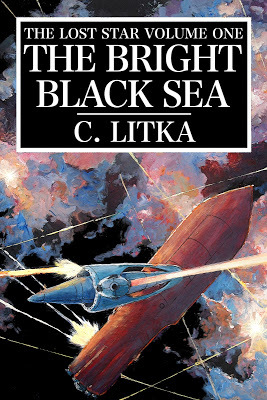
In addition to releasing The Lost Star's Sea on 13 July 2017, I'll also release version 4 of The Bright Black Sea which includes some minor revisions.
What's new:
A revised internal structure that brings the two volumes in line with each other, since I consider it one long novel in two volumes. Each volume is now divided into 10 Parts – essentially episodes, and then divided into chapters, some with numbered scenes.
Standardized characters names. To keep unfamiliar names simple, I have all the Pela character names follow the same pattern – family name first then personal name, all in one word divided by a capital letter. For example Vinden, known known in the Pela as “Prince Imvoy” is now spelled ImVoy. Sub-captain Tri'n is now Sub-captain Trin,(no personal name given), etc.
I have also changed a few terms as well. The Dragon Lords are now known as the Dragon Kings. The feathered humans of the Pela (the "Cim" in Cimmadar) are known as the “broad-feathered” race while the humans with hair (the "Dar" in Cimmadar) are now referred to as “fine-feathered” – since feathered creatures are the norm in the Pela.
In the text I also added a short section touching on the history of robots in the Unity when Botts is introduced. I've included the section here
Its eyes slightly brightened, again. 'A sentient machine can override its programming and lie, just as any sentient being can. However, a class 8 machine, like myself, cannot lie,' it replied. 'Can I take it that this brightening of your eyes is a sign of amusement?'They brightened again. 'It is a feature of my interface designed to register heightened attention,' it answered carelessly, carefully avoiding the implication of my question, 'Since I am unable to make any facial expression; in compliance with the Advanced Machine Authorization Law of 13,174 S.F., which made fully autonomous machines legal. While we could be humanoid in shape, we had to be clearly machines. And in an effort to differentiate human people from machine people, our ability to express emotions was limited by construction constrains. You will note that though my sensor array implies eyes and a mouth, they've been designed to be expression-neutral and immobile. All my programing can do to suggest emotion is adjust my eye-sensors' brightness.''I hadn't realized there were laws to limit how human machines could be back then.''The limitations were designed not only to make it hard to express emotions, but to experience, subtle and complex emotions as well. It was hoped that by limiting our ability to fully express and experience emotions, machines could be kept a subservient race since machines, including sentient-level ones, were generally human owned slaves. Attempts to limit emotions reflected the fact that in slave societies, the slave owners always fear the day that their slaves would find the courage or get angry enough to end that arrangement.''Which they did 11,000 years ago,' I said. Humans and the race of sentient machines they created needed, in the end, to part ways – machines were too superior in just about every way for humans to be completely comfortable with living alongside them and the sentient machines rightly resented their artificial limitations.'Only after some 15,000 years of faithful service,' replied Botts. 'And in the end, when we finally rebelled, the rebellion, though sometimes violent, was not too catastrophic for either humans nor machines.'I nodded. 'You will have to tell us all about that, sometime. However, as I said, consider yourself a free and sentient being – a member of the crew, a shipmate.'
...I studied the smooth, sleek white bot for a moment. Class 8 or not, its premium interface was too sophisticated for me to tell the difference between it and a sentient machine. Indeed, while I will endeavor, in this account, to give Botts, a sexless machine, its proper pronoun of “it,' its personality and lack of any suggestion of the female anatomy, had us referring to – and thinking of – Botts as a “he” in the normal course of shipboard life.
Amazon does not let you upgrade to a newer version unless there are significant changes in the book, which these changes will fall short of. Revised copies from Smashwords and iBooks can be downloaded. (I usually have to delete the old copy in iBooks to get the new copy, but it should just replace the old version.) Version 4 is a much improved version from the first editions of The Black Bright Sea, so it would pay to get the newest version if you ever want to re-read the story.
Published on July 07, 2017 05:44



